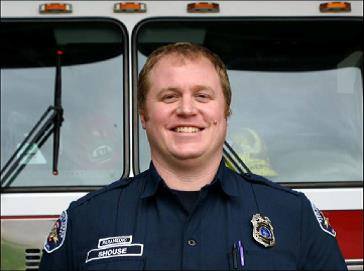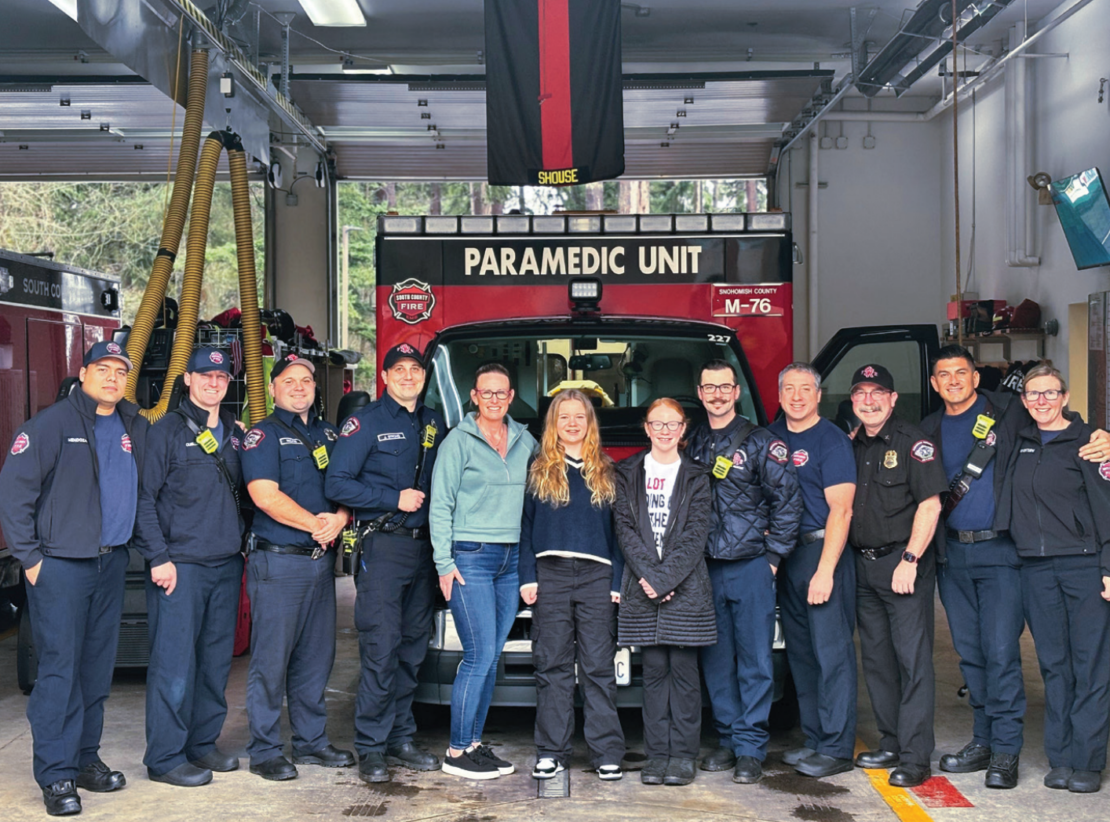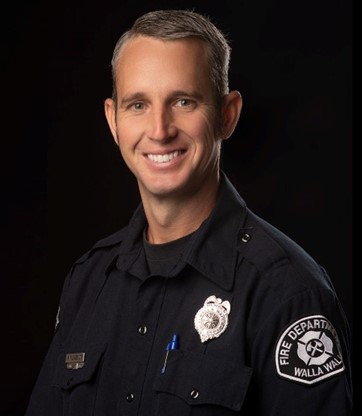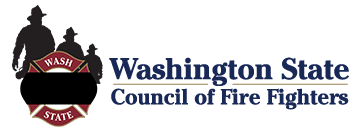
by: Kalina Shouse
Erik Shouse, L2781 Snohomish County, died at age 40 from cardiac arrest at his home on Camano Island in April 2018. A year later, the Department of Labor and Industries determined that he died in the line of duty of an occupational disease. His wife, Kalina, has been a tireless advocate for fire fighters and their families. Her work with the WSCFF legislative team has been key to our success on several fronts. In this article, she shares insights from her experience.
This article is for fire fighters, new and old, and for the people who love them. It is about how you can use my family’s story, the Shouses, to help your family. I hope that the family member who glances through this publication will start a conversation with their fire fighter. It isn’t a fun conversation and preparation takes time, but it is a potentially lifesaving conversation with life-altering implications.
I experienced the unexpected death of my husband, and my daughters lost their dad at the tender ages of five and seven. There are no words to adequately explain that pain, but I have many words on one topic: how to protect yourself and your family. Your job as a firefighter has inherent risks, both physical and mental. It is known that this job also has a disproportionately high number of occupational diseases such as cancers and heart disease. As fire fighters, once you walk into the station, you are in on mode, also known as fight or flight response, thanks to our sympathetic nervous system. This prepares your body to be responsive to whatever emergent call may come across the station tones. You train and drill in preparation for the endless possibilities you could encounter at work.
You need to be just as vigilant with your healthcare; it is more than just exercise and diet. My husband did his annual department physical, including blood work and an electrocardiogram (EKG). He proactively followed up with his primary care doctor months before passing away from heart disease at the age of 40. He had no known risk factors. It wasn’t enough, and he didn’t meet the general medical guidelines for cardiac evaluation, except that he was a fire fighter.
Working with healthcare professionals who understand that your job is your risk factor is paramount for your life, loved ones, and union brothers and sisters. As a fire family, it would behoove each of you to share resources with each other regarding fire fighter health. Build a local network of licensed and credited medical professionals committed to understanding the risks of your job and doing additional and earlier testing for heart disease, cancers, and traumas. Complacency is not an option. Soon, I hope to see a recommended list of cardiac screenings for fire fighters that can be used to start a conversation with your doctor.
Early in your career, it was probably overwhelming to understand all your benefits, including
•payroll deductions,
•the Law Enforcement Officers & Firefighters (LEOFF) pension,
•healthcare programs like the Medical Expense Reimbursement Plan (MERP) and Voluntary Employees’ Beneficiary Association (VEBA),
•medical insurance plans,
•disability programs,
•Personal Injury, Illness and Exposure Reporting System (PIIERS), and
• Line-of-Duty Death (LODD) benefits
It is overwhelming just to read the list. On top of all that information, you must understand presumptive illnesses and the RCW language for presumptive diseases. The day my husband passed away, the question repeated by many was, “When was the last time he was on shift?” I soon realized they were calculating presumption in their heads. Not one person in my vast fire family spread throughout Washington knew that the most important sentence in that RCW is not about presumptive qualification but rather, “When presumption does not apply, the claim is not automatically denied. However, the burden is on the worker to prove that the condition is an occupational disease.” I had to discover this and started the journey to file a claim with Washington State’s Department of Labor & Industries (L&I) for my husband’s death to be determined to be an occupational disease. It became evident that a shift in the conversation needed to happen. I have shared what I learned with anyone I can and was given this platform to deliver this message because the WSCFF agrees that presumption is not the only determining factor in deciding to submit a claim.
The final aspect is financially protecting your family, especially if you have children, in the event of your death. You need a substantial private life insurance policy. I’m not referring to a broker; I don’t profit from this advice. Your family is removed from your health insurance at the end of the month that their fire fighter passes away. Did you know that they do not get your LEOFF pension as if you retired on the day you die if it is not a line-of-duty death (LODD)? It is refunded at 150% of the cash value. The cash value is the amount of money deposited by you/employer each month you work. The cash-out value of my husband’s almost 16-year LEOFF pension was calculated at a monthly rate of less than 25% of what his monthly pension would have been as of that date. Not to mention the mental toll of dealing with grief so profound while trying to keep your family financially solvent. So, if you get married or are expecting a child, get a life insurance policy. Your deferred comp and cash-out pension value are insufficient to provide for your family.
The final piece is to document your exposures at work. PIIERS has your collective exposure history if you ever need that data. Create a work culture of proactive health to reduce cardiovascular risks, reduce the effects of the sympathetic response’s effects on the body over the span of your fire fighting career, decrease inflammation, eat/live a low[1]inflammatory lifestyle. Learn how to go from sympathetic response, aka fight or flight to parasympathetic, aka rest and digest. Work with healthcare professionals who are educated on the health risks of fire fighting, or educate them on the disproportionately high numbers of heart disease, cancer, and PTSD among fire fighters. The leading causes of fire fighter deaths are cancer and heart disease. In your profession, it is important to plan for the worst and hope for the best; also known as being proactive until an emergency comes along, then your preparation and training allow you to be reactive in the best way possible. So why not apply it to your and your family’s life? I don’t want others to have to go through what I went through, and what some are currently going through. Get a life insurance policy or some other means of funds set up that are readily available to you at a moment’s notice.

Epilogue
by: Racquel Pleasants

Ryan Pleasants, L404 Walla Walla, died on January 7, 2024, at the age of 41, from a heart attack while on duty. We are grateful to his wife, Racquel, for sharing her thoughts on this very recent loss.
Becoming a widow does something to you. It flips everything upside down and changes you. Your ability to grasp it all and function is foggy. There is no timeline to when that clears. There is no map or tide table for the uncharted waters of survivorship. The waves will go by in varying sizes: some hit you hard, and some never stop. As a novice fire widow, I am grateful for this fire family, their support, guidance, love, and respect through this life before and after Ryan’s death.
As sorrowful as it is, I am thankful for other fire widows, like Kalina Shouse, who has been navigating these waters over the last six years without her husband, Erik, the father of their children. She has a perspective only fire widows will understand and grasp.
Kalina and I understand the importance of advocating for you, your fire fighter, and your fellow fire fighters: medically, emotionally, and financially. We don’t want you to experience what we (widows) and our families are experiencing day in and day out. This world is more complex than ever, with more inflammation and stress amongst its true beauty. We want you to be able to go home to your families, loved ones, and friends.
Fire fighters and their families are cognizant of what it means to be a Fire Family, and I am very thankful for that.
Thank you.
Racquel Pleasants
